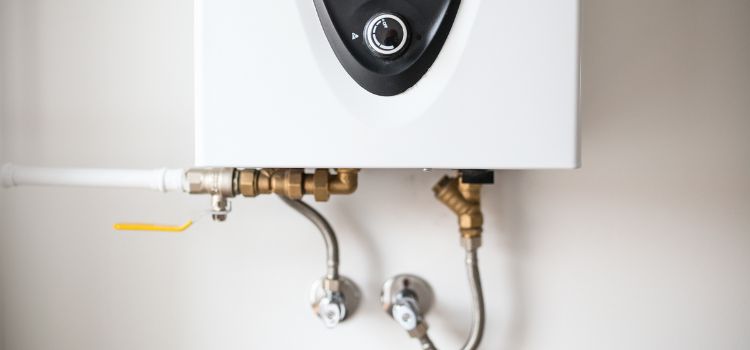As an Amazon Associate I earn from qualifying purchases.
Have you ever been surprised by your water heater beeping out of the blue and wondered what may be going on? You’re not the only one going through this. Despite their generally straightforward operation, water heaters sometimes make beep noises that point to more serious problems. Let’s examine the causes of this phenomena and the solutions available to you.

Understanding Water Heaters
Let’s take a moment to review the definition of a water heater before delving into the causes for the beeping. A water heater is essentially an equipment that warms water for use in the home, including laundry, dishwashing, and bathing. A tank, heating element, thermostat, and many safety measures are usually included.
Common Reasons for Water Heater Beeping
Sediment Buildup
Sediment accumulation is one of the most frequent causes of a water heater beeping. The water supply’s minerals and debris may build up in the tank’s bottom over time, leading to overheating and perhaps setting off the alarm.
Temperature Sensor Issues
Problems with the temperature sensor might be another offender. The control panel may get erroneous indications from malfunctioning sensors that are in charge of tracking the water’s temperature, which might result in blaring warnings.
Pressure Problems
Beeping in the water heater might also be caused by pressure issues. The alarm may sound when excessive pressure builds up for a number of reasons, including a closed input valve or a malfunctioning pressure release valve.
Electrical Faults
Electrical issues might also cause the beeping, such as loose wiring or a broken control panel. To prevent further damage to the appliance, it’s crucial to address these problems immediately.
Troubleshooting Steps
Here are some actions you may do to troubleshoot your water heater if it is beeping:
Turn off the Power: Electrical issues might also cause the beeping, such as loose wiring or a broken control panel. To stop further harm to the appliance, these problems must be fixed right away.
Check for Visible Issues: Examine the water heater’s exterior for indications of wear and tear, leaks, or loose connections.
Inspect the Temperature Settings: Ensure that the thermostat’s temperature settings are appropriately adjusted, and make any necessary changes.
Flush the Tank: Flush the tank to get rid of any collected material if you think there may be a sediment buildup. For this procedure, adhere to the manufacturer’s recommendations.
Test the Pressure Relief Valve: Make that the pressure relief valve is operating properly and releasing excess pressure as necessary by giving it a test.
Calling a Professional
While you can fix some problems with DIY troubleshooting, hiring a qualified plumber or technician is often the best course of action. Don’t be afraid to bring in the professionals if you’re not sure how to continue or if the issue still exists after your best attempts.
Maintaining a water heater regularly is essential to avoiding problems and extending its life. Plan yearly tank checks and think about occasionally emptying and cleaning the tank to get rid of sediment accumulation.
Preventive Measures
The following precautions, in addition to routine maintenance, will help reduce the likelihood that your water heater will beep:
Monitor for Warning Signs: Address any warning signs promptly, including strange noises, leaks, or fluctuations in water temperature.
Maintain Adequate Ventilation: Make sure the ventilation on your water heater is adequate to avoid gas buildup and lower the chance of overheating.
Conclusion
In conclusion, successful troubleshooting requires an awareness of the causes of a water heater beeping, including silt accumulation, temperature sensor difficulties, pressure concerns, and electrical failures. You may take immediate action to resolve the problem and guarantee the smooth functioning of your water heater by following the recommended procedures for troubleshooting and preventative measures.
Recall that the best way to avoid future issues is to do routine maintenance and to be alert for any warning indications. It’s best to seek expert help if problems continue after attempting do-it-yourself fixes in order to prevent further harm. You can prolong the life and efficiency of your water heater and guarantee that you will always have access to hot water for your home’s requirements by being knowledgeable and taking preventative action.
FAQs
A intermittent beeping sound may indicate little problems, including variations in water pressure or temperature. But it’s crucial to keep a careful eye on things and respond quickly to any reoccurring alerts.
Ignoring the beeping is not a good idea since it can be a sign of underlying issues that might become worse over time. It’s essential to look into what’s causing the alert and take the necessary measures.
It’s advisable to plan regular maintenance for your water heater to ensure peak performance and to spot any potential problems early on.
Although householders may safely make small repairs on their own, it’s important to use care and have a basic grasp of the parts of the appliance. It is advisable to seek expert advice for more difficult concerns.
It’s critical to quickly shut off the water supply and power source if you discover any leaks coming from your water heater. After that, get in touch with a licensed plumber to evaluate the issue and make the required fixes.
As an Amazon Associate I earn from qualifying purchases.









Spot on with this write-up, I really feel this amazing site needs a great deal more attention. I’ll probably be returning to read more, thanks for the information!
Hi! Someone in my Facebook group shared this site with
us so I came to give it a look. I’m definitely loving the information. I’m bookmarking and will be
tweeting this to my followers! Exceptional blog and terrific style
and design.
What’s up everyone, it’s my first pay a quick visit at this website, and piece
of writing is truly fruitful designed for me, keep up posting such articles.